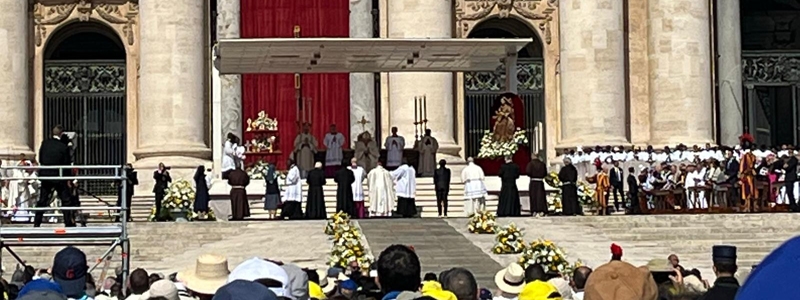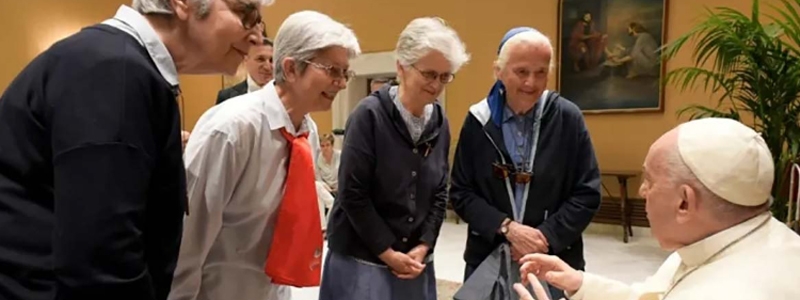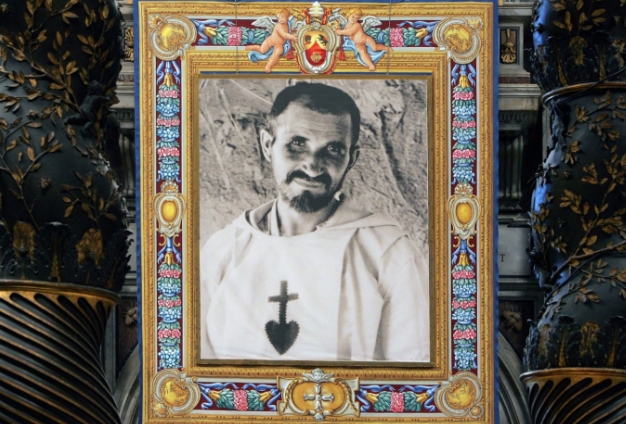Canonization

Charles de Foucauld was canonized on May 15, 2022 during a Mass presided by Pope Francis in St. Peter’s square, Vatican City. Charles was one of ten men and women declared saints during the ceremony, which was held outdoors under sunny skies. A crowd of more than 50,000 people were in attendance, the largest gathering at St. Peter’s since pandemic restrictions were eased.
During his homily, Pope Francis reflected on the meaning of holiness:
“At times, by over-emphasizing our efforts to do good works, we have created an ideal of holiness excessively based on ourselves, our personal heroics, our capacity for renunciation, our readiness for self-sacrifice to achieve a reward. This can at times appear as an overly ‘Pelagian’ way of viewing life and holiness. We have turned holiness into an unattainable goal. We have separated it from everyday life, instead of looking for it and embracing it in our daily routines, in the dust of the streets, in the trials of real life and, in the words of Teresa of Avila to her Sisters, ‘among the pots and pans.’ Being disciples of Jesus and advancing on the path of holiness means first and foremost letting ourselves be transfigured by the power of God’s love. . . . Holiness does not consist of a few heroic gestures, but of many small acts of daily love. . . . Truly, the Lord has a plan of love for everyone. He has a dream for your life, for my life, for the life of each of us. What else can I say? Pursue that dream with joy.”

A few days after the canonization, the Pope met with about 50 representatives of the Spiritual Family of Charles de Foucauld in a Vatican office. There the Pope talked about the impact of Brother Charles – now also Saint Charles – on his own life:
“I would also like to thank Saint Charles de Foucauld because his spirituality did me so much good when I was studying theology, a time of maturation and also of crisis, and which came to me through Father Paòli and through the books of [René] Voillaume, which I read constantly, and helped me so much to overcome crises and to find a way of Christian life that was simpler, less Pelagian, closer to the Lord. I thank the Saint and bear witness to this, because it did me so much good.”
Voillaume is the founder of the Little Brothers of Jesus, an order inspired by Saint Charles. The “Pelagian” concept of holiness, which the Pope also brought up in his homily for the canonization, is a heresy promoted by Pelagius in the early 400s. It rejects the idea of original sin and promotes the belief that we can attain righteousness through our own efforts and good works.
The Pope called Saint Charles a “a prophet for our time” who “knew how to bring to light the essentiality and universality of faith.”
The Pope said that Charles condensed the meaning of faith “into two simple words, in which there is everything: ‘Jesus – Caritas’; and above all, returning to the spirit of the origins, the spirit of Nazareth.”
“I hope that you too, like Brother Charles, will continue to imagine Jesus who walks in the midst of the people, who patiently carries out laborious work, who lives the daily life of a family and of a city. How happy the Lord is to see that he is imitated in the way of smallness, humility, sharing with the poor!
“Charles de Foucauld, in the silence of the hermit’s life, in worship, and in service to his brothers, wrote that while ‘we are inclined to favor works, whose effects are visible and tangible, God gives first place to love and then to sacrifice inspired by love and to obedience derived from love’ (Letter to Marie de Bondy, 20 May 1915).
“As a Church we need to return to the essential – return to the essential! – not to get lost in so many secondary matters, at the risk of losing sight of the simple purity of the Gospel.”
Saint Charles, the Pope continued, lived his faith as
“a brother to all, starting from the smallest. He wrote: ‘I want to accustom all Christians, Muslims, Jews and idolaters to consider me as their brother, the universal brother’ (Letter to Marie de Bondy, 7 January 1902). And to do this, he opened the doors of his house so that it might be ‘a port’ for all, ‘the shelter of the Good Shepherd.’ I thank you for bearing this witness, which does so much good, especially at a time when there is a risk of closing in on particularisms, of increasing distances, of losing sight of one’s brother. We unfortunately see this in the news every day.”
Pope Francis also spoke of Charles as an apostle of joy:
“Brother Charles, in the hardships and poverty of the desert, remarked: ‘My soul is always in joy’ (Letter to Fr. Huvelin, 1 February 1898). Dear sisters and brothers, may Our Lady grant you to cherish and nourish the same joy, because joy is the clearest witness we can give to Jesus in every place and at every time.”
Here is video of the Canonization Mass from Vatican News:
The full text of Pope Francis’ homily from the Canonization Mass is here:
Blog posts from our website that may be of interest:
The Canonization of Charles de Foucauld – Read Sr. Virginia’s account of attending the ceremony in Rome.
The Timeline of a Saint – Also has a photo gallery.
Miracles Happen – Read about the miracle attributed to Charles that led to his canonization.
What is the Use of Proclaiming Saints? – Learn about the value of making heavenly friends.
Beatification of Charles de Foucauld
On November 13, 2005, Charles was beatified, a step along the way toward sainthood, at the Basilica of St. Peter in Rome. This bestowed upon him the title of “Blessed.”
Here is an excerpt from Pope Benedict XVI’s address at the Beatification Mass:
“Let us give thanks for the witness borne by Charles de Foucauld. In his contemplative and hidden life in Nazareth, he discovered the truth about the humanity of Jesus and invites us to contemplate the mystery of the Incarnation; in this place he learned much about the Lord, whom he wanted to follow with humility and poverty.
“He discovered that Jesus, who came to join us in our humanity, invites us to universal brotherhood, which he subsequently lived in the Sahara, and to love, of which Christ gave us the example. As a priest, he placed the Eucharist and the Gospel at the heart of his life, the two tables of the Word and of the Bread, source of Christian life and mission.”
The beatification of Charles was official recognition of his life of heroic virtue. He was publicly declared to be a guide for men and women on their journey to God.

